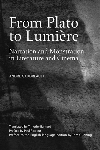
From Plato To Lumière: Narration And Monstration In Literature And Cinema
André Gaudreault
University of Toronto Press
$27.95
paper
240pp
978-0-8020-9586-2
That last triple-narratived sentence gives you some indication of the difficulties this subject poses. “Narrative” doesn’t just mean a voice telling us what’s happening; it’s an amorphous word that could use redefining. The author reaches back to Plato and Aristotle – whose terms, it turns out, need redefining, too – to create a new grammar of narrative in Greek poetry, theatre, and, finally, cinema.
You will probably have gathered by now that this is an academic text, with all its stylistic implications. It comes with a preface by Continental-philosophy heavyweight Paul Ricoeur, whose noun-starved sentences make you appreciate Gaudreault’s efforts to sound approachable. But even Gaudreault’s prose style announces, if you’re a tourist here, you should leave now.
A friendlier way of saying this is that the author can tease a category into finer and finer threads, and is willing to go on teasing long after most of us would have given up. It’s one of the qualities that make a good paper-producing academic. Here it produces a book on cinematic narrative in which long stretches pass without a single film being mentioned, and where sometimes nothing appears to be happening but definitions splitting into more definitions.
A chapter-by-chapter check reveals that progress is being made. Yet for chapters on end, the nightmarish feeling persists that the argument is expanding in all directions without possessing forward motion or a central point. When you do arrive at a section that quotes from film-industry documents and covers a measurable amount of historical ground, it’s as if you’ve landed on an island after a swim that took much longer than you’d bargained for.
The English-language publishers have added film stills that weren’t part of the first French edition, at a guess to make the proceedings look a bit friendlier. (This assumption is necessary because the stills don’t amplify the text in any way.) The author does something similar by inserting verbal Gallic shrugs (“This is trans-semiotization, that is plain to see!”) here and there, the kind of thing a professor drops into his lectures to reassure his students that they’re all in this together. It’s supposed to sidestep the need to make a truly friendly gesture – a narrative arc, for instance.
If From Plato to Lumière never comes up with that arc, it does at least have a surprise twist, in an aside near the end: “Film analysis … will always be in need of new conceptual categories in order to remain fresh,” says Gaudreault. In other words, the discipline’s survival depends on a continual supply of questions: that’s one of the reasons why a book like this gets written. Fair enough – though it doesn’t explain why even a book as closely argued as this one should ask questions in a way that seems designed to keep anyone from reading them. That is one of the great unasked questions of academe. mRb






0 Comments